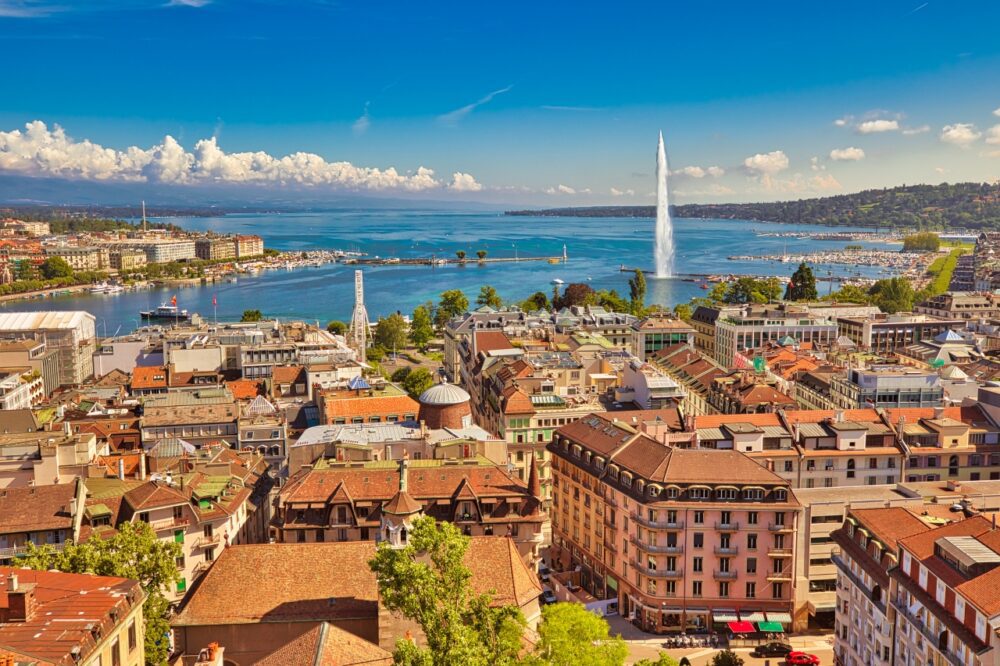
Geneva, Switzerland’s cosmopolitan lakeside city, is known for its international flair, luxurious atmosphere, and stunning natural surroundings. Nestled on the shores of Lake Geneva and framed by the Alps, this city offers a mix of history, culture, and breathtaking scenery. From exploring the iconic Jet d’Eau and strolling through the Old Town to visiting the United Nations headquarters and indulging in world-class chocolate, Geneva has plenty to offer. But with so many beautiful Swiss destinations, you might wonder: is Geneva worth visiting? In this post, we’ll uncover what makes Geneva special and help you decide if it’s the right destination for your trip.
Table of Contents
Pros – Reasons You Should Visit Geneva
1. A Scenic Lakeside Setting
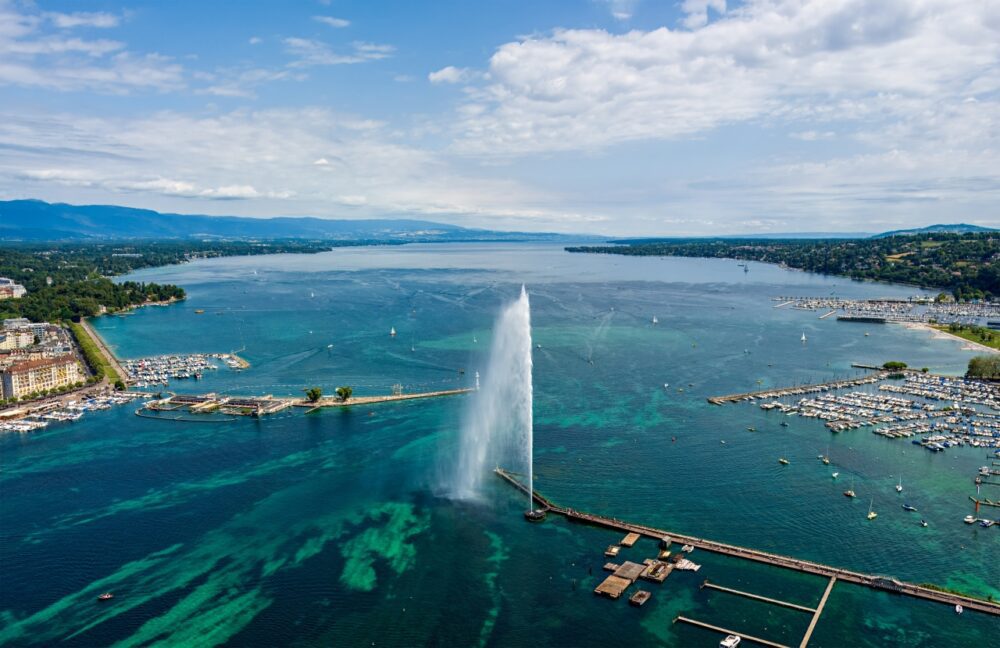
Geneva’s stunning location on the shores of Lake Geneva (Lac Léman), surrounded by the Alps and Jura Mountains, provides breathtaking natural beauty. The lake’s crystal-clear waters are perfect for boat rides, swimming, or simply admiring from one of the city’s many promenades.
I took a scenic boat cruise across Lake Geneva, soaking in views of the snow-capped Alps and the famous Jet d’Eau, the city’s iconic water fountain. Walking along the Quai du Mont-Blanc, I enjoyed the serene atmosphere and panoramic vistas. Geneva’s lakeside charm is undeniably one of its greatest draws, offering both relaxation and photo-worthy moments.
2. The Iconic Jet d’Eau
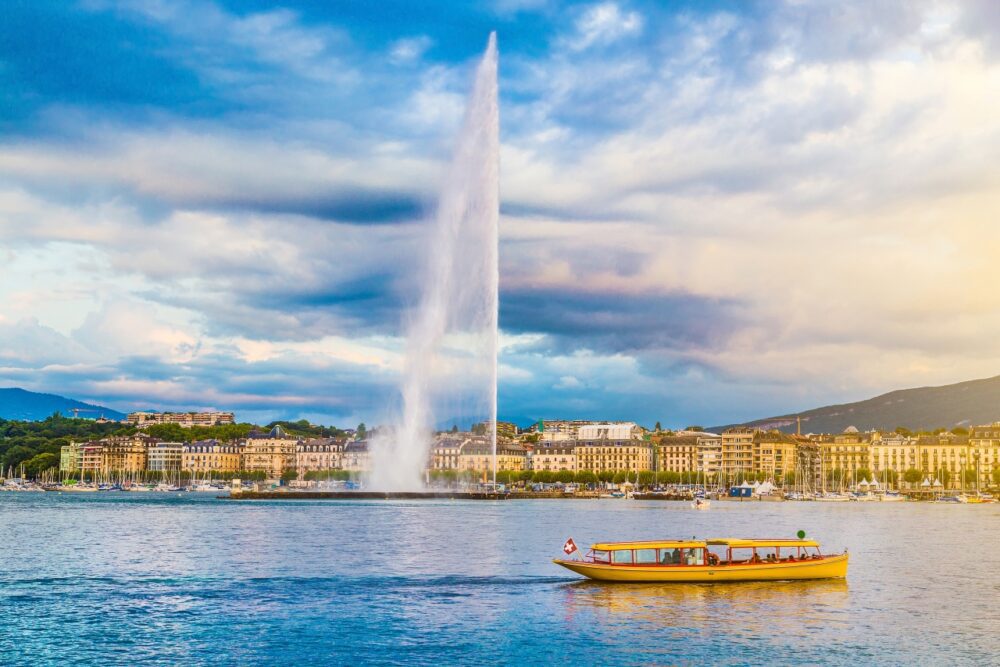
The Jet d’Eau, one of the tallest water fountains in the world, is Geneva’s most recognisable landmark. Shooting water 140 metres into the air, it’s visible from much of the city and provides a striking focal point on the lake.
Getting close to the Jet d’Eau, I was amazed by its sheer power and elegance. It’s a fantastic spot for photos, and the cool mist on a sunny day adds a refreshing touch. Whether viewed from a boat, the lakeshore, or one of the city’s many parks, the fountain embodies Geneva’s elegance and connection to its natural surroundings.
3. International Hub and Multicultural Atmosphere
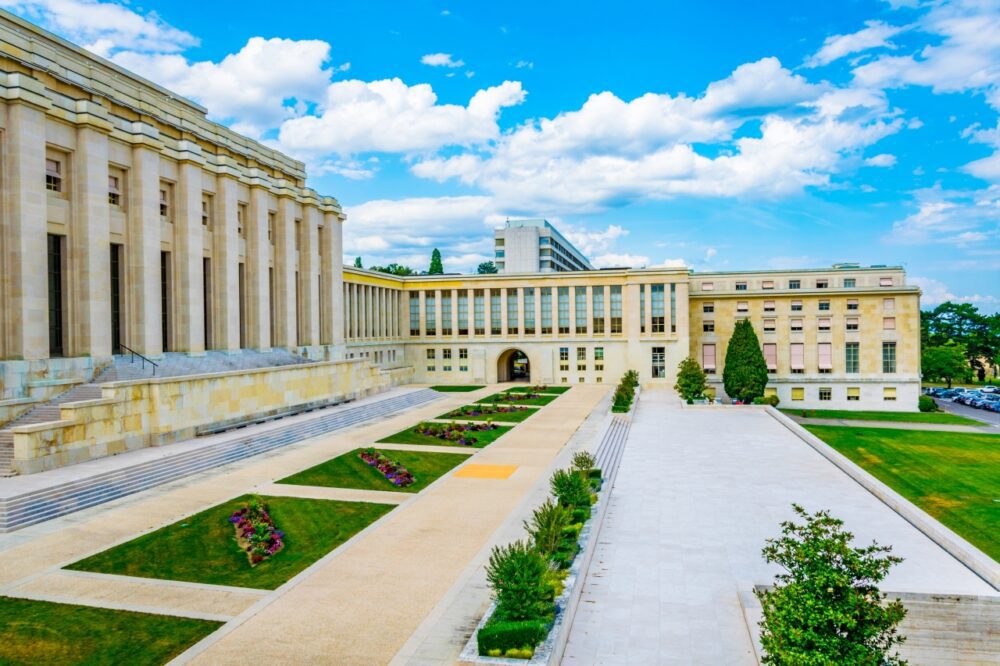
Geneva is home to numerous international organisations, including the United Nations, the World Health Organization, and the International Red Cross, giving the city a global and multicultural vibe. The international presence ensures a diversity of languages, cuisines, and cultural experiences.
I visited the Palace of Nations (Palais des Nations) and took a guided tour that provided fascinating insights into the UN’s role in global diplomacy. Exploring Geneva, I appreciated its cosmopolitan feel, where conversations in French, English, German, and other languages create a vibrant, inclusive atmosphere.
4. World-Class Museums and Cultural Institutions
Geneva boasts an impressive array of museums, from the Art and History Museum (Musée d’Art et d’Histoire) to the Patek Philippe Museum, which showcases the city’s watchmaking heritage. The Red Cross and Red Crescent Museum offers a moving look at humanitarian efforts worldwide.
I spent an afternoon at the Art and History Museum, admiring its diverse collections of art, archaeology, and applied arts. Later, the Patek Philippe Museum provided a glimpse into Geneva’s legacy as a leader in fine watchmaking. Geneva’s museums cater to a wide range of interests, making them must-visits for culture lovers.
5. A Gateway to the Alps
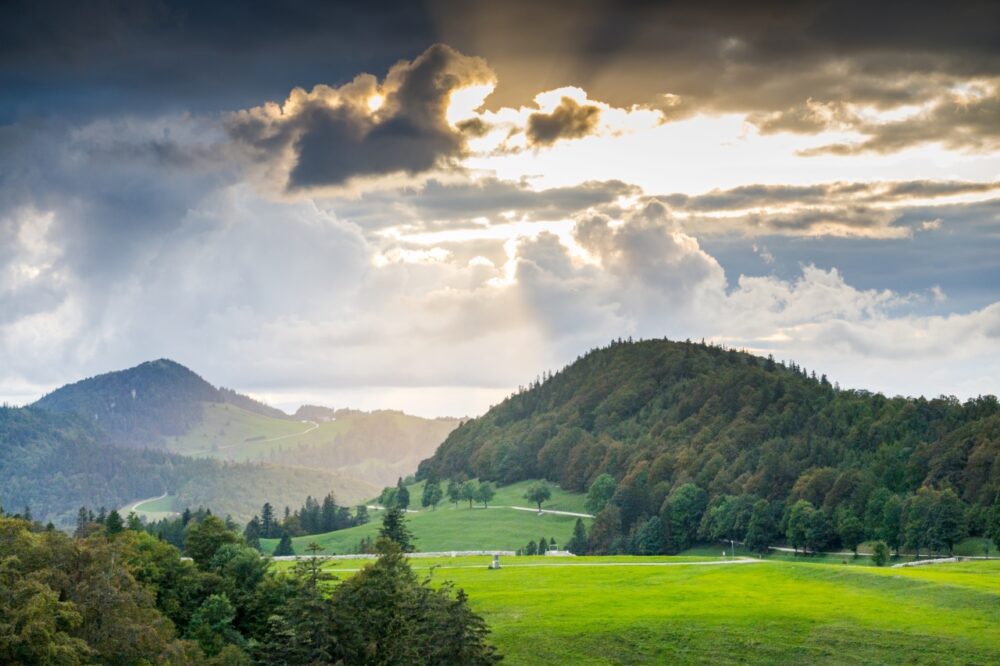
Geneva’s proximity to the Alps makes it an excellent base for outdoor enthusiasts. Day trips to ski resorts like Chamonix-Mont-Blanc or hiking in the Jura Mountains are easily accessible, offering adventure just a short journey from the city.
I took a day trip to Chamonix and was captivated by the majestic landscapes and the chance to ride the Aiguille du Midi cable car for spectacular views. Geneva’s easy access to nature ensures a perfect balance between urban exploration and outdoor escapades.
6. Exquisite Swiss Cuisine
Geneva offers a culinary scene that combines traditional Swiss dishes with international flavours. Local favourites include fondue, raclette, and filets de perche (lake fish), often enjoyed with a glass of Swiss wine.
I dined at a lakeside restaurant, savouring a creamy fondue paired with fresh bread and potatoes. For dessert, chocolate truffles from a local chocolatier were an indulgent treat. Geneva’s gastronomy celebrates high-quality ingredients and meticulous preparation, delighting food enthusiasts.
7. Beautiful Parks and Green Spaces
Geneva is one of Europe’s greenest cities, with abundant parks and gardens that provide peaceful retreats. The Parc des Bastions, Parc de La Grange, and the Botanical Gardens (Jardin Botanique) are highlights for nature lovers.
I strolled through the Parc des Bastions, admiring the Reformation Wall and enjoying the relaxed atmosphere. The Botanical Gardens impressed me with their diverse plant collections and scenic lake views. Geneva’s green spaces are perfect for leisurely walks, picnics, or simply unwinding in a serene setting.
8. A Rich Historical Heritage
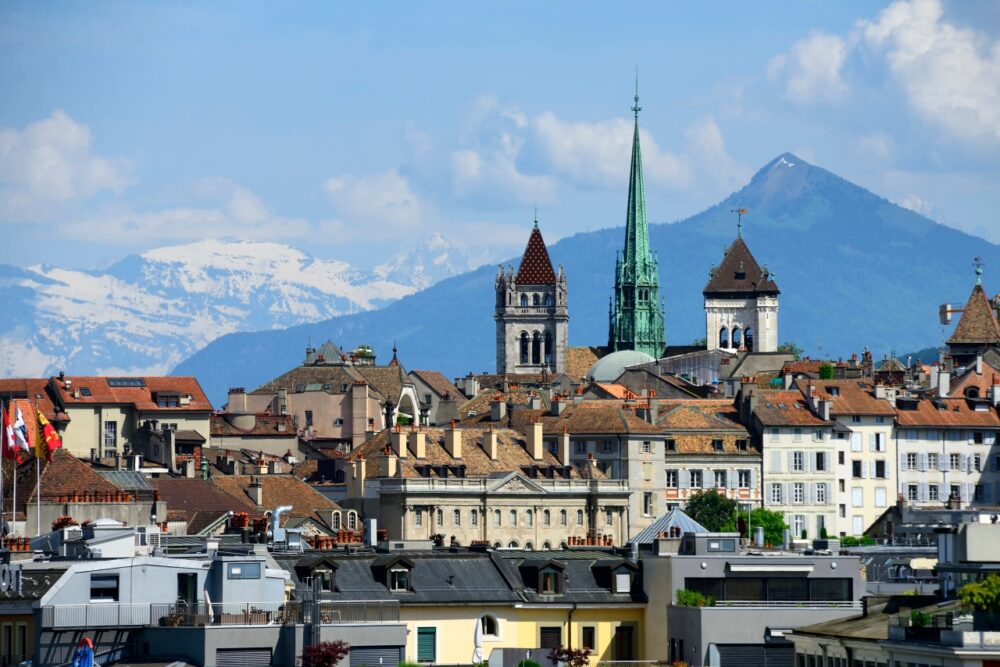
Geneva’s history, as a centre of the Protestant Reformation and a hub of trade and diplomacy, is reflected in its landmarks and neighbourhoods. The St. Pierre Cathedral and the Old Town (Vieille Ville) are must-visit areas for history buffs.
Climbing the towers of St. Pierre Cathedral provided incredible views of the city, while the cobblestone streets of the Old Town were a joy to explore. The city’s historical charm blends seamlessly with its modern aspects, offering a unique experience for visitors.
9. Shopping for Luxury and Local Delights
Geneva is a shopper’s paradise, whether you’re searching for luxury watches, high-end fashion, or local delicacies like Swiss chocolate and cheese. The Rue du Rhône is renowned for its upscale boutiques, while local markets offer artisanal goods and fresh produce.
I browsed luxury watch stores showcasing exquisite craftsmanship and picked up Swiss chocolates from a local chocolatier. Geneva’s shopping scene caters to every taste, from high-end luxury to authentic, local finds.
10. Safe and Well-Connected City
Geneva is consistently ranked as one of the world’s safest cities, offering a sense of security for visitors. Its efficient public transport system, including trams, buses, and boats, makes exploring the city and surrounding areas convenient.
I used the city’s public transport pass, provided by my hotel, to easily get around and even take a boat ride on the lake. The well-organised system and overall cleanliness of the city enhanced the ease of my visit. Geneva’s safety and connectivity make it a stress-free destination for travellers of all types.
Cons – Things to Consider When Visiting Geneva
1. High Cost of Living
Geneva is one of the most expensive cities in the world. Accommodation, dining, and activities often come with a steep price tag, making it challenging for budget-conscious travellers. Even basic expenses like public transport and coffee can feel pricey.
During my visit, I found that dining at restaurants and staying in centrally located hotels quickly added up. While the quality of services is excellent, travellers on a budget may need to plan carefully. Opting for more affordable accommodations outside the city centre, dining at casual spots, and taking advantage of free activities, like exploring Geneva’s parks, can help manage costs.
2. Crowds During Peak Seasons
Geneva attracts a mix of business travellers, diplomats, and tourists year-round, which means its popular attractions like Jet d’Eau, St. Pierre Cathedral, and Lake Geneva promenades can feel crowded, particularly in summer.
When I visited in July, the lakefront was bustling, making it harder to enjoy the serene atmosphere. Lines at major sites like the Palace of Nations were longer than expected. Visiting during the shoulder seasons or exploring early in the day can help avoid peak crowds and ensure a more relaxed experience.
3. Limited Nightlife Options
Geneva’s nightlife is relatively subdued, with fewer options for late-night entertainment compared to cities like Zurich or Paris. The city caters more to sophisticated evenings at wine bars or upscale restaurants than vibrant clubs or live music venues.
I enjoyed a relaxed evening at a lakeside bar but found the options for more lively experiences limited. For those seeking energetic nightlife or diverse after-dark activities, Geneva may feel too quiet. However, the calm vibe suits those looking for a more refined and peaceful evening.
4. Weather Can Be Unpredictable
Geneva’s proximity to Lake Geneva and the Alps means the weather can change quickly. Summers can include unexpected rain showers, while winters often bring cold winds and overcast skies. This variability can disrupt plans for outdoor activities.
On my trip, a sunny afternoon quickly turned into a rainy evening, which caught me unprepared. Packing layers, a rain jacket, and comfortable walking shoes is essential for staying comfortable in Geneva’s unpredictable climate. Having indoor attractions like museums as a backup ensures your plans aren’t entirely weather-dependent.
5. Traffic and Parking Challenges
While Geneva’s public transport is efficient, driving in the city can be stressful due to narrow streets, heavy traffic, and limited parking. Visitors renting cars for day trips may find city driving and finding parking particularly inconvenient.
During my stay, I struggled to locate parking near the Old Town and experienced delays during peak hours. Using public transport within the city and renting a car only for excursions outside Geneva can help alleviate these challenges.
When to Visit Geneva
The best times to visit Geneva are spring (April to June) and autumn (September to October). During these months, the weather is mild, the lakefront blossoms with flowers, and outdoor activities like strolling the Jardin Anglais or boating on the lake are at their best. Summer (July to August) offers warm temperatures and a lively atmosphere, with festivals like the Fêtes de Genève adding excitement, but it’s also the busiest and priciest time to visit. Winters are quieter and perfect for a base to explore nearby ski resorts or enjoy the festive charm of the Christmas markets.
How to Get to Geneva
Geneva International Airport (GVA) is just 4 kilometres from the city centre, making it incredibly convenient. The airport is well-connected to major cities via airlines like Swiss, easyJet, and Lufthansa. Upon arrival, you can take a free train (with a ticket from airport machines) to Geneva’s central station, a journey that takes just 7 minutes. Buses and trams also connect the airport to various parts of the city, while taxis and ride-hailing apps are readily available. Geneva is also accessible by train from other Swiss cities and neighbouring countries, including France, which is just across the border.
Where to Stay in Geneva
Geneva offers a range of accommodation options to suit all preferences and budgets:
- Luxury: Lakeside or Old Town – Stay at the iconic Hotel d’Angleterre, known for its timeless elegance and lake views, or the opulent Four Seasons Hotel des Bergues, offering top-tier service and spa facilities.
- Mid-range: Pâquis or Carouge – Ideal for comfort and accessibility. Consider Hotel Rotary Geneva, blending charm with modern amenities, or Hotel Cornavin, a stylish choice near the train station.
- Budget: Plainpalais or Around Gare Cornavin – Affordable yet convenient. Options like Ibis Styles Geneva Gare or City Hostel Geneva offer great value within easy reach of the city’s main attractions.
Getting Around Geneva
Geneva’s compact size and excellent public transport system make getting around easy and convenient. The Unireso network includes trams, buses, and boats (Mouettes Genevoises) that crisscross the city and surrounding areas. Visitors staying in Geneva hotels receive a free Geneva Transport Card, providing unlimited access to public transport during their stay. For eco-friendly travel, the city’s Genève Roule scheme offers free bike rentals for up to four hours. Walking is the best way to explore the Old Town and lakeside promenades, while taxis and ride-hailing apps are available for more flexibility.
How Long to Spend in Geneva
Two to three days is ideal to experience Geneva’s highlights. Spend one day exploring the Old Town, visiting St. Pierre Cathedral and the Maison Tavel, then stroll along the lake to see the iconic Jet d’Eau. Dedicate another day to world-class museums like the Red Cross Museum or the Patek Philippe Museum and enjoy a boat cruise on Lake Geneva. With extra time, take a day trip to Montreux, Chamonix, or the Lavaux vineyards, a UNESCO World Heritage site. Geneva’s mix of natural beauty, cultural richness, and international flair makes it a must-visit Swiss destination.
Conclusion
So, is Geneva worth visiting? Definitely! If you’re drawn to a city that combines natural beauty, cultural landmarks, and a touch of sophistication, Geneva is an excellent choice. Its mix of lakeside relaxation, international culture, and Swiss charm makes it a versatile destination. That said, Geneva’s high costs and formal vibe might not appeal to every traveller. But for those ready to embrace its elegance and stunning surroundings, Geneva offers a unique and unforgettable experience.
